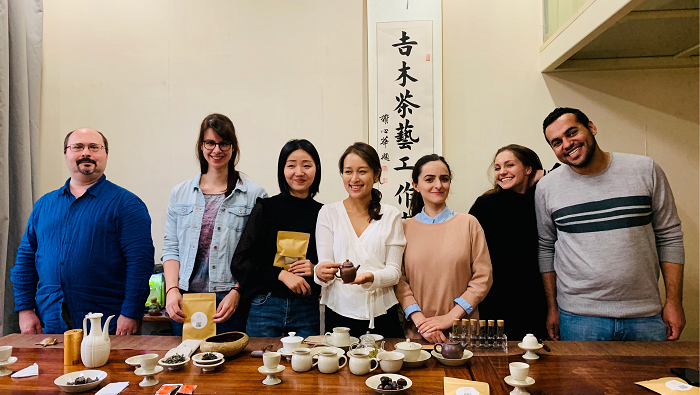An engaging and entertaining way to learn about Chinese culture and history.
JIMU is a self-described “senior tea specialist” and the owner of Jimu Studio, where she provides advanced training in the Chinese “art of tea”, that is, the knowledge and culture surrounding tea-making and drinking. On the suggestion of esteemed colleague, Dr. Wen ZHAO, lecturer at the College of Philosophy of Nankai University, Dr. Dimitri DRETTAS met with Jimu and decided to organize an extra-curricular session for the students of the Elite Graduate Program "Standards of Decision-Making Across Cultures" spending the Fall term 2019-2020 in Beijing, and who he was advising, teaching to, and generally taking care of, with the collaboration of the European Center for Chinese Studies (ECCS) at Peking University, headed by Mr. Christian BUSKÜHL.
Five of the eight students present in Beijing that semester, each hailing from a different country (China, Germany, Armenia, Egypt and Russia) attended the event, along with Dr. Drettas. Leading the session in flawless English (only two of the students were proficient in Mandarin Chinese, the others having just began to learn the language), Ms. Jimu went through a precise overview of the historical roots of Chinese tea culture and the evolution of tea-making techniques (boiling, diancha and brewing) from the 1st to the 18th century CE. Her scholarly background allowed her to provide precise information on the social and cultural context of tea history.
She then proceeded with a presentation of the six categories of tea: green, oolong, black, white, dark, yellow, which participants were invited to taste. After describing the function of all the special utensils and demonstrating traditional tea-serving etiquette, Jimu invited those willing to practice it. Throughout the session, she kept interacting with the students, inquiring about their previous tea-drinking experience and making sure to answer any questions they had, and to dispel common misconceptions. Since Jimu’s background is in Japanese studies, she was particularly attentive in explaining what distinguishes the very ritualized “Way of Tea” centered on green tea in Japan and the less formal Chinese “art of tea” she herself practices and teaches.
Enthusiastic feedback on an experience allowing for a deeper understanding and appreciation of life in China
Students’ feedback on the event was extremely positive, as even those who are familiar with Chinese culture and society discovered many aspects of this heritage which they had not been aware of. Those students who were in China for the first time found a unique way to learn more about the country’s culture through the lens of tea drinking, a practice narrowly tied to art and history.
Text: Elite Graduate Program „Standards of Decision-Making Across Cultures“


